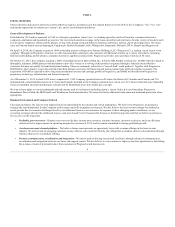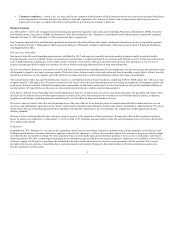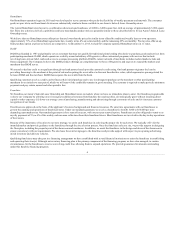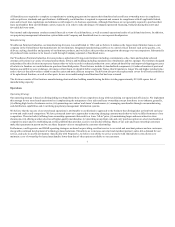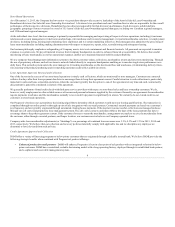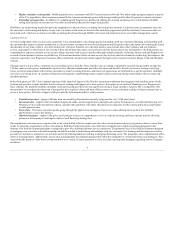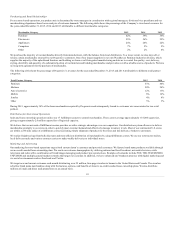Aarons 2015 Annual Report Download - page 15
Download and view the complete annual report
Please find page 15 of the 2015 Aarons annual report below. You can navigate through the pages in the report by either clicking on the pages listed below, or by using the keyword search tool below to find specific information within the annual report.
Aaron’s business is subject to certain risks and uncertainties. Any of the following risk factors could cause our actual results to differ materially from
historical or anticipated results. These risks and uncertainties are not the only ones we face, but represent the risks that we believe are material. However, there
may be additional risks that we currently consider not to be material or of which we are not currently aware, and any of these risks could cause our actual
results to differ materially from historical or anticipated results.
Currently, nearly every state, the District of Columbia, and most provinces in Canada specifically regulate lease-to-own transactions. This includes states in
which we currently operate Aaron’s Sales & Lease Ownership stores, as well as states in which our Progressive business has retail partners. While no federal
law currently specifically regulates the lease-to-own industry, federal legislation to regulate the industry has been proposed in the past and may be proposed
in the future. For example, federal and regulatory authorities such as the Consumer Financial Protection Bureau (the "CFPB") and the FTC are increasingly
focused on the subprime financial marketplace in which the lease-to-own industry operates, and may propose and adopt new legislation (or interpret existing
regulations) that could result in significant adverse changes in the regulatory landscape for businesses such as ours. Furthermore, our debt collections
practices are subject to federal and state laws and regulations. Many of these laws and regulations are evolving, unclear and inconsistent across various
jurisdictions, and ensuring compliance with them is difficult and costly. For example, with increasing frequency, federal and state regulators are holding
businesses like ours to higher standards of training, monitoring and compliance. Failure by us or those businesses to comply with the laws and regulations to
which we are or may become subject could result in fines, penalties or limitations on our ability to conduct our business, or federal or state actions, or private
litigation, any of which could significantly harm our reputation with consumers and Progressive’s and DAMI’s retail and merchant partners and could
materially and adversely affect our business, prospects and financial condition.
The risks in Progressive’s virtual lease-to-own business differ in some potentially significant respects from the risks of Aaron’s store-based lease-to-own
business. These risks, whether arising from the offer by third party retailers of Progressive’s lease-purchase solution alongside traditional cash, check or credit
payment options or otherwise, may also be materially adverse to our operations, prospects or financial condition. Furthermore, Progressive’s business relies
on third party retailers (over whom Progressive cannot exercise the degree of control and oversight that Aaron’s and its franchisees can assert over their own
respective employees) for many important business functions, from advertising through assistance with lease transaction applications. Accordingly, there is
the potential that regulators may target virtual lease-to-own transactions and/or implement new legislation (or interpret existing regulations) that could
negatively impact Progressive’s ability to offer virtual lease-to-own programs through third party retail partners.
In addition, as we execute on our strategic plans, we may continue to expand into complementary businesses, such as DAMI, that engage in financial,
banking or lending services that are subject to a variety of statutes and regulatory requirements in addition to those regulations currently applicable to our
legacy operations, which may impose significant costs, limitations or prohibitions on the manner in which we currently conduct our businesses as well as
those we may acquire in the future. Any additional laws or regulations may result in changes in the way our operations are regulated, exposing us to increased
regulatory oversight, more burdensome regulations and increased litigation risk, each of which could have a material adverse effect on us.
Any proposed rulemaking by the CFPB, the FTC or any other federal or state regulators or other adverse changes in (or interpretations of) existing laws and
regulations, the passage of new adverse legislation or regulations by the federal government or the states applicable to our traditional lease-to-own business,
our Progressive virtual lease-to-own business, our Aarons.com e-commerce business and any complementary businesses into which we may expand could
materially increase both our compliance costs and the risk that we could be subject to government investigations and subject to sanctions if we are not in
compliance. In addition, new burdensome laws or regulations could force us to modify our business model, expose us to increased litigation risk, and might
reduce the economic potential of our sales and lease ownership operations.
14


